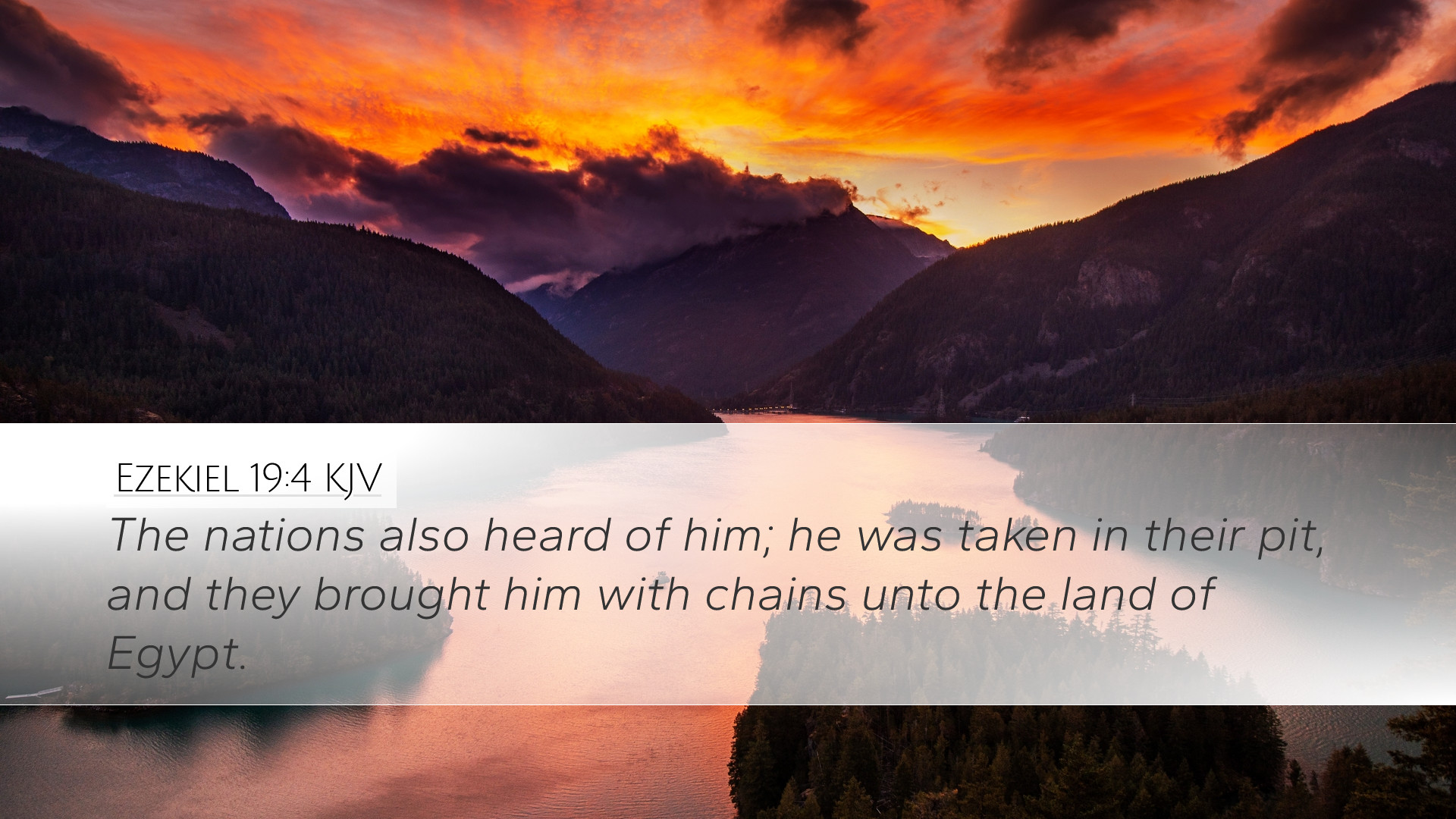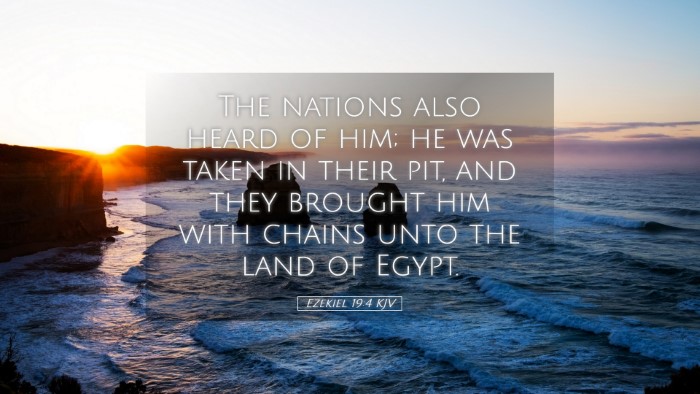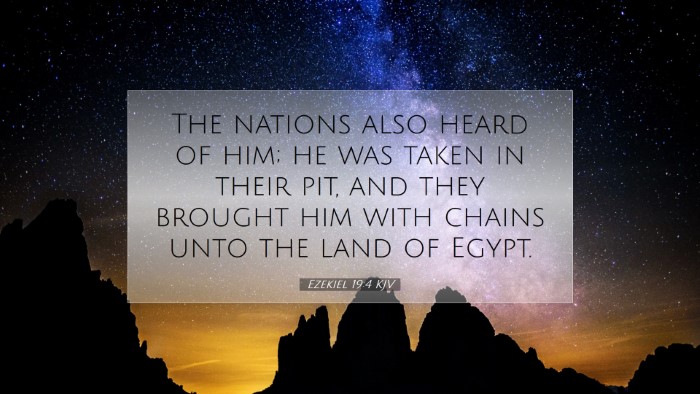Bible Commentary on Ezekiel 19:4
Bible Verse: Ezekiel 19:4
"Then the nations set against him on every side from the provinces; and they spread their net over him: he was taken in their pit."
Introduction
The passage from Ezekiel 19:4 presents a vivid metaphor that describes the downfall of a significant leader, often interpreted in the context of the historical events surrounding the kingdoms of Israel and Judah. This commentary draws insights from esteemed public domain commentaries by Matthew Henry, Albert Barnes, and Adam Clarke to provide a comprehensive understanding for pastors, theologians, students, and scholars.
Contextual Background
To fully grasp the implications of Ezekiel 19:4, it is essential to understand the historical context surrounding the text. Ezekiel, a prophet active during the Babylonian exile, utilized rich imagery and allegories to communicate God's message to the people of Israel. Chapter 19 serves as a lament for the princes of Israel, employing the metaphor of a lion and the plight of its cubs to illustrate their fate.
Exegesis of the Verse
The verse employs striking imagery to depict the struggles faced by the people of Israel, reflecting the broader theme of judgment and consequence for turning away from God.
1. The Nations Set Against Him
Henry notes that the nations symbolize the foreign powers that rise against Israel and its leaders. This raises themes of the external pressures Israel faced, illustrating God’s judgment through these nations. The "provinces" refer to the origins of these nations, which signify that the threat was comprehensive and multifaceted.
2. Spread Their Net
Albert Barnes provides insight into the imagery of a net. The "net" represents the cunning and deceitful strategies of the enemies, designed to ensnare and capture the leader of Israel, which resonates with the spiritual demise caused by succumbing to worldly temptations and alliances. This notion emphasizes the providential hand of God allowing such entities to enact judgment on His unfaithful people.
3. Taken in Their Pit
Adam Clarke elaborates the metaphor surrounding the “pit.” It reflects a trap meant for the adversary but indicates that the leaders of Israel, instead, fell victim to their own failings. The pit can represent both literal entrapment as well as a spiritual decline, highlighting how Israel's leaders were ensnared by their own sins and the consequences thereof.
Theological Implications
This verse serves as a solemn reminder of the repercussions of leadership failure. Theological themes arise regarding God's sovereignty in using nations to fulfill His purposes and the moral obligations of leaders to remain faithful to their divine calling.
Divine Sovereignty and Judgment
Understanding the divine sovereignty of God is crucial. God is depicted as the ultimate authority who permits the nations' encroachment as a form of discipline against wayward Israel. This reflects a God who is actively involved in history, orchestrating events for the sake of His covenant people.
Leadership and Accountability
Commentators emphasize the heightened accountability of leaders. The leaders of Israel, akin to the lion in the metaphor, are called to shepherd their people righteously. Their failure to uphold justice, maintain spiritual discipline, and remain committed to God results in national calamity. This serves as a poignant exhortation for current leaders in both ecclesiastical and secular spheres.
Human Sinfulness and Consequence
This passage emphasizes the nature of human sinfulness, demonstrating how disobedience to God leads to entrapment and ruin. There is a theological reflection on the nature of sin, how it ensnares individuals, and how, without repentance, the consequences are often destructive not only for the individual but for the entire community.
Lessons for Today
The lessons drawn from Ezekiel 19:4 resonate with contemporary audiences in significant ways:
- The Importance of Vigilance: Leaders must remain vigilant against the temptations and distractions that may lead them away from their divine purpose.
- God’s Justice: The ultimate justice of God will prevail, serving as a comfort to the righteous and a warning for the unruly.
- The Need for Repentance: There is a continuous call for repentance among individuals and leaders alike, emphasizing the need to turn back to God to avoid the pitfalls highlighted in the text.
- Community Responsibility: The fate of a nation is tied to the spiritual health of its leaders; thus, everyone shares responsibility in fostering a faithful community.
Conclusion
Ezekiel 19:4 serves as a sobering yet profound illustration of the consequences of failing leadership and societal dereliction in adhering to God’s ways. The insights drawn from Matthew Henry, Albert Barnes, and Adam Clarke remind us of the lasting significance of prophetic literature in guiding contemporary ethical and theological understanding. For pastors, students, and scholars, this verse provides rich ground for reflection on divine justice, leadership responsibilities, and the inevitable consequences of sin.


